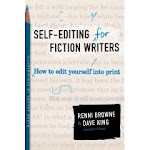One of the things I see most often in the manuscripts I edit is a writing style that tells the story instead of showing the action. Even if you've heard it all before - we all need to constantly be on guard against telling our story. Today I'll share some examples of how to connect with your reader through active verbs and specific nouns.
Example #1
The scent was fresh and new like a flower after the rain.
Verb choice - was
Noun choice – flower
This sentence isn’t bad, but it could be great. The writer in this example is telling instead of showing.
Example #2
The fresh scent hung in the air like a late blooming rose after the rain.
Verb choice – hung
Noun choice – rose (specifically a late blooming rose)
This sentence is great because it doesn’t tell us about the smell. Instead, the writer invites us to remember a smell. This is showing. It draws the read in and invites them to experience what’s happening.
Let’s look at two more examples
Example #3
Susan felt restless.
Verb choice – felt
Noun choice – Susan
Again, the writer is telling us how Susan felt
Example #4
Susan paced across the floor, wearing a pattern in the dust.
Verb choice – paced, wearing
Noun – Susan, floor, dust
Can you see the difference? The writer is again pulling us in with word pictures, showing us the action.
Special Note: There are times when telling is better than showing. You want to use telling when the action isn’t important or when it’s a common action that doesn’t need emphasis. For example, you don't have to say, "Susan bent her knees and lowered herself into the chair." Unless, you're trying to emphasize the WAY she's sitting to let us know her emotion. If she just sat, say, "Susan sat in the chair."
There are some words to watch for - words that can let you know you're telling instead of showing.
Felt
Remembered
Knew
Watched
Saw
Looked
Was
words that end in ing
words that end in ly
Okay, now it's your turn. Take one of the following sentences and make it great.
The morning was foggy.
Jacob was so mad he couldn't speak.
The smell made Penny sick.
Subscribe to:
Post Comments (Atom)












Not sure if this works ... Anger trapped Jacob's answer in his throat. Multipublished, and I still struggle with this at times...Good examples!
ReplyDeleteI think it works well - I have a sympathetic lump in my throat! You're right though, we all struggle with this issue.
ReplyDeleteThis is always a great challenge and keeps me on my toes. Thanks for the fun exercise.
ReplyDeleteThe morning fog hovered over the moor like a downy blanket.
Great visual, Carla. I can really picture the scene!
ReplyDeleteI love your examples! How about. . .The morning fog crept though the valley leaving water droplets in its path.
ReplyDeleteJanet, that rates an oooh! You've summed up a span of time with a very visual sentence, good job!
ReplyDeleteSorry, I'm coming in late on this one. Not sure my try is as good as the other awesome examples above, but here goes nothing.
ReplyDeleteJacob was so mad he couldn't speak.
With his jaw clenched so tight it'd take a crowbar to pry it open, Jacob took a deep breath through his flaring nostrils to calm himself. He pointed his finger and tried to speak, but instead socked the man in his pompous nose.
Sandi,
ReplyDeleteI love it!
Hi Edie, I've thought of this post often as I've been working on my WIP this week. Thanks for the timely reminder!
ReplyDelete